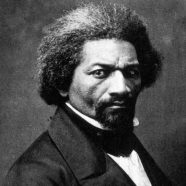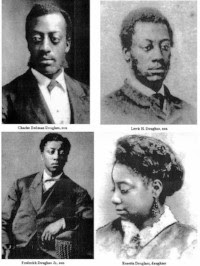
Two Hundred Years Later, Frederick Douglass Teaches Us That Fatherhood Still Matters
Frederick Douglass, born 200 years ago in 1818, was never completely sure of his father’s identity. All he knew for certain was that his father was a white man who had raped his mother. Yet Douglass would become a loving, devoted father of five, who remained actively involved in the lives of his children and grandchildren for his entire life.
Douglass wrote at length about how slaveholders deliberately prevented blacks from forming families and tore them apart when they did form. Douglass noted the irony of Christian slaveholders who extolled the virtues of family for themselves while denying slaves the right to marry and care for their own children, saying:
The warm defender of the sacredness of the family relation is the same that scatters whole families,– sundering husbands and wives, parents and children, sisters and brothers, leaving the hut vacant, and the hearth desolate.
When the Civil War finally ended slavery, black Americans responded to emancipation by marrying and forming tightly knit families that were at last recognized by the law, at least in theory. According to US Census data from 1890 until 1970, black marriage rates were actually higher than white marriage rates, and the overwhelming majority of black children lived with their married biological parents.
Douglass was one of many former slaves who used his freedom to marry and raise children. In fact, he married the love of his life, Anna Murray, within days of escaping to freedom, and their first child was born about a year later. He famously stated, “It is easier to build strong children than to repair broken men,” illustrating his deep insight into the importance of a role he would faithfully fulfill in his own children’s lives, despite never having had a father himself.

Frederick Douglass’ children, Charles, Lewis, Frederick, and Rosetta (top left to bottom right).
Today, however, just 29 percent of African American children live with their married, biological parents. Many explanations have been offered for this tragedy, including the legacy of slavery, the incarceration of large numbers of black men, and the preponderance of government aid programs that financially punish women for marrying the fathers of their children.
Whatever the cause, it is undeniable that children who grow up without their fathers suffer because of their absence. Decades of research confirm that the presence of the biological father in the home reduces risk for a myriad of problems, including drug use, criminal activity and incarceration, and risky sexual behavior in his children, while increasing the levels of academic achievement and emotional and physical health.
Skeptics of the importance of fathers decry any attention given to these well-established disparities, dismissing them as victim-blaming. Others try to reduce our presence in our children’s lives to a mere economics, suggesting that our children would do just as well from receiving our child support payments every month as they would with our attention, care, protection, and guidance — in other words, our simple loving presence in their lives.
But even fatherless children who grow up to be very successful express a wish for more than just an financial support in their childhoods.President Barack Obama remarked in 2013, “I turned out okay. But at the same time, I wish I had had a father who was around and involved.” Lecrae, one of many rappers whose father abandoned him, wrote of the pain:
No happy family ‘cuz Daddy left me
Deep in the Valley of the Shadow of Death
I’m feeling the breath of a predator on my neck
Ate me alive while Daddy was getting high
Trying to chase after something that I’m certain he’ll never find
When the whole time, he could have had my young mind
Unlike the days of slavery, there are now no laws that prevent men from caring for their children. This Father’s Day, let us honor the memories and legacies of men like Frederick Douglass, who blazed a trail for strong fatherhood in our nation. Let us honor the men who have faithfully done their job in our own lives. Most importantly, let us commit to give our own children what they want and need the most: our presence.
By Reverend Dean Nelson
Rev. Nelson is the National Outreach Director at Human Coalition and Chairman of the Douglass Leadership Institute.



